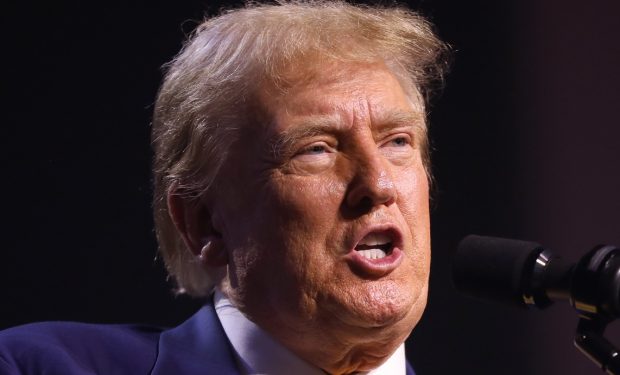GOP presidential nominee Donald Trump sat for an interview with Bloomberg Editor-In-Chief John Micklethwait and the Economic Club of Chicago this week and dissembled consistently when asked straightforward economic questions, frequently substituting his own personal experience for a world view. (“I can speak from that standpoint,” he said, describing shifts to how topics impact him.)
In the case regarding the potential anti-trust breakup of Alphabet — more commonly known as Google — Trump demonstrated that his thinking about Google was largely personal and about how its search engine prioritized stories concerning him. The former President seemed willing to barter less legal trouble for the Silicon Valley giant for more positive treatment of him.
One Bulwark newsletter contends the interview demonstrates the “big guy’s solipsism, his buffoonish overconfidence, his utter inability to engage on matters of policy.”
Trump: Look, Google’s got a lot of power. They’re very bad to me. Very, very bad to me. I mean, I can speak from that standpoint. They only have bad stories. In other words, if I have 20 good stories and 20 bad stories and everyone’s entitled to that, you’ll only see the 20 bad stories. And I called the head of Google the other day and I said I’m getting a lot of good stories lately. But you don’t find them in Google. I think it’s a whole rigged deal. I think Google’s rigged, just like our government is rigged all over the place.
Micklethwait: You would break them up, in other words?
Trump: I’d do something. You have to have, look, I give a lot of credit. They’ve become such a power. It’s such a power. And you’ve got to give them credit for that. How they became a power is really the discussion. At the same time it’s a very dangerous thing, because we want to have great companies. We don’t want China to have these companies. You know China is a very powerful, very smart group of people.
Later returning to Google when asked about banning Chinese-owned TikTok because it’s presumed to be a threat, Trump says:
“Sometimes you have to fight through these threats. You know, you can’t, just like Google. I’m not a fan of Google, they treat me badly. But are you going to destroy the company by doing that? If you do that are you gonna destroy the company? What you can do without breaking it up is make sure that it’s more fair. They do treat me very badly.”
[NOTE: Trump’s other recent experiences speaking at Economic Clubs also exposed his propensity to focus on his personal views and avoid specifics, a habit his supporters are forgiving of — or even praise. At the Economic Club of New York in September, Trump was pilloried in the press for answering a question about child care with a rambling disquisition on tariffs — text below.]
Trump’s answer at the Economic Club of New York on whether he would “prioritize childcare” produced this answer:
“Well, I would do that, and we’re sitting down. You know, I was somebody — we had, Senator Marco Rubio, and my daughter Ivanka, was so impactful on that issue. It’s a very important issue.
“But I think when you talk about the kind of numbers that I’m talking about — that, because look, child care is child care, couldn’t — you know, there’s something — you have to have it in this country. You have to have it. But when you talk about those numbers, compared to the kind of numbers that I’m talking about by taxing foreign nations at levels that they’re not used to. But they’ll get used to it very quickly. And it’s not going to stop them from doing business with us. But they’ll have a very substantial tax when they send product into our country. Those numbers are so much bigger than any numbers that we’re talking about, including child care, that it’s going to take care. We’re going to have — I look forward to having no deficits within a fairly short period of time, coupled with the reductions that I told you about on waste and fraud and all of the other things that are going on in our country.
“Because I have to stay with child care. I want to stay with child care. But those numbers are small relative to the kind of economic numbers that I’m talking about, including growth, but growth also headed up by what the plan is that I just — that I just told you about. We’re going to be taking in trillions of dollars. And as much as child care is talked about as being expensive, it’s, relatively speaking, not very expensive compared to the kind of numbers will be taking in.
“We’re going to make this into an incredible country that can afford to take care of its people. And then we’ll worry about the rest of the world. Let’s help other people. But we’re going to take care of our country first. This is about America first. It’s about make America great again. We have to do it because right now, we’re a failing nation. So we’ll take care of it. Thank you. Very good question. Thank you.”
